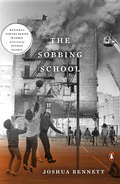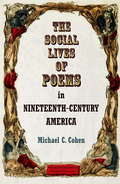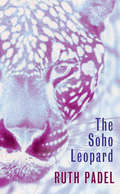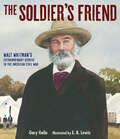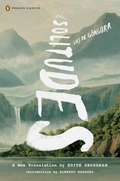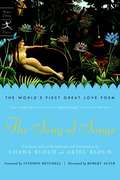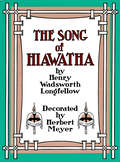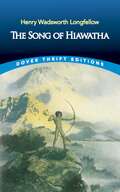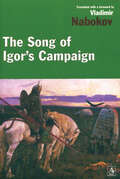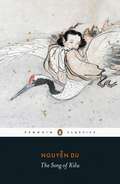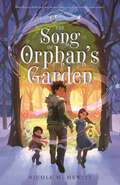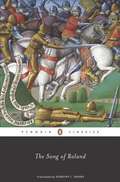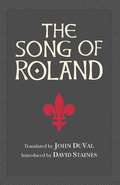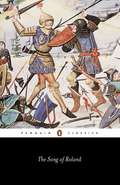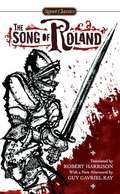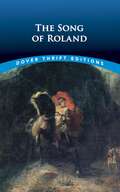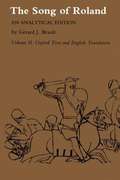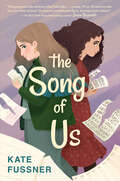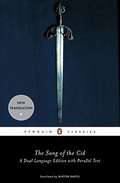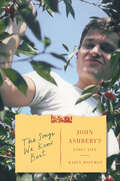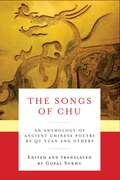- Table View
- List View
The Sobbing School (Penguin Poets)
by Eugene Gloria Joshua BennettSelected by Eugene Gloria as a winner of the National Poetry Series The Sobbing School, Joshua Bennett's mesmerizing debut collection of poetry, presents songs for the living and the dead that destabilize and de-familiarize representations of black history and contemporary black experience. What animates these poems is a desire to assert life, and interiority, where there is said to be none. Figures as widely divergent as Bobby Brown, Martin Heidegger, and the 19th-century performance artist Henry Box Brown, as well as Bennett's own family and childhood best friends, appear and are placed in conversation in order to show that there is always a world beyond what we are socialized to see value in, always alternative ways of thinking about relation that explode easy binaries.From the Trade Paperback edition.
The Social Lives of Poems in Nineteenth-Century America (Material Texts)
by Michael C. CohenPoetry occupied a complex position in the social life of nineteenth-century America. While some readers found in poems a resource for aesthetic pleasure and the enjoyment of linguistic complexity, many others turned to poems for spiritual and psychic wellbeing, adapted popular musical settings of poems to spread scandal and satire, or used poems as a medium for asserting personal and family memories as well as local and national affiliations. Poetry was not only read but memorized and quoted, rewritten and parodied, collected, anthologized, edited, and exchanged.Michael C. Cohen here explores the multiplicity of imaginative relationships forged between poems and those who made use of them from the post-Revolutionary era to the turn of the twentieth century. Organized along a careful genealogy of ballads in the Atlantic world, The Social Lives of Poems in Nineteenth-Century America demonstrates how the circulation of texts in songs, broadsides, letters, and newsprint as well as in books, anthologies, and critical essays enabled poetry to perform its many different tasks. Considering the media and modes of reading through which people encountered and made sense of poems, Cohen traces the lines of critical interpretations and tracks the emergence and disappearance of poetic genres in American literary culture. Examining well-known works by John Greenleaf Whittier and Walt Whitman as well as popular ballads, minstrel songs, and spirituals, Cohen shows how discourses on poetry served as sites for debates over history, literary culture, citizenship, and racial identity.
The Soho Leopard
by Ruth PadelBeautiful, disturbing and a pleasure to read, Ruth Padel's new poems are her most ambitious yet, adding animal legend and zoological science to her glitteringly imaginative canvas. With her gift for bringing together experiences and tones of voice that normally stay far apart, she sweeps us from Dulwich Pizza Hut to ancient Siberia, King's Cross to nineteenth-century Burma. We meet Socrates, urban foxes, Louisiana alligators and the endangered Amur leopard in poems resonating with sensuous delight in nature, but also with history and loss.Finally, a Chinese painter searches for tigers in a forest doomed to the sawmill while the minister who sold it scoffs an aphrodisiac bowl of tiger-penis soup.Hallucinatory and lyrical, passionately musical, seething with life, The Soho Leopard explores our human need for wildness- and also for stories, wherever we find them. A wonderfully ferocious new collection from one of our most exciting poets.
The Soldier's Friend: Walt Whitman's Extraordinary Service in the American Civil War
by Gary GolioWalt Whitman is celebrated as an iconic American poet, but few know of the crucial and heroic role he played tending to the wounded and dying in Civil War hospitals. This nonfiction picture book highlights Whitman&’s compassion and teaches an important lesson about empathy, making this a perfect social-emotional learning title for young readers.In December of 1862, Walt Whitman left Brooklyn, New York, for the war-torn South after seeing his brother's name on a list of wounded Union soldiers. What he found on the battlefields completely changed his life, as he came face to face with not only the wounded, but the dying. Whitman spent the next three years working part-time in Washington, DC, visiting and ministering to soldiers in the city&’s many military hospitals. Caring for the sick and dying was not easy, but Whitman was committed to his chosen service. He became known as "the soldiers&’ friend," and was bound—in his own way—to save and heal the America he wrote about and loved so deeply.New York Times-bestselling author Gary Golio and Caldecott Honor artist E. B. Lewis bring Whitman&’s story and his passion for America to life, complete with quotes from Whitman&’s works, and extensive backmatter, which includes a bibliography and photographs.
The Solitudes
by Edith Grossman Alberto Manguel Luis De GongoraAn epic masterpiece of world literature, in a magnificent new translation by one of the most acclaimed translators of our time. A towering figure of the Renaissance, Luis de Góngora pioneered poetic forms so radically different from the dominant aesthetic of his time that he was derided as "the Prince of Darkness." The Solitudes, his magnum opus, is an intoxicatingly lush novel-in-verse that follows the wanderings of a shipwrecked man who has been spurned by his lover. Wrenched from civilization and its attendant madness, the desolate hero is transported into a natural world that is at once menacing and sublime. In this stunning edition Edith Grossman captures the breathtaking beauty of a work that represents one of the high points of poetic achievement in any language.
The Song Of Songs: The World's First Great Love Poem
by Chana Bloch Ariel BlochComposed more than two thousand years ago, this book of the Old Testament is not only an essential religious and literary text, but also a source of inspiration to modern-day poets and lovers.
The Song of Hiawatha
by Henry Wadsworth Longfellow Herbert MeyerThe publisher is proud to present this new edition of an old American favorite, authentically and unforgettably illustrated by a distinguished American artist.Artist-illustrator Herbert Meyer's illustrations give new life to Longfellow's epic poem. <P><P>Besides being warmly evocative, they are historically authentic, for the artist did extensive research on the American Indians. Meyer's artistic vision does full justice to Longfellow's immortal epic, which is not only an American favorite, but is known and admired throughout the world for its hauntingly beautiful poetry.The Song of Hiawatha's particular blend of myth and history, native tradition and foreign influence has survived the years, and its artistic authenticity is undisputed. The same, we hope, can be said for the illustrations of Herbert Meyer, brought to light in this new, digital edition.
The Song of Hiawatha
by Henry Wadsworth LongfellowReturn to the shores of Gitche Gumee and sing the Song of Hiawatha Out of childhood into manhood Now had grown my Hiawatha, Skilled in all the craft of hunters, Learned in all the lore of old men, In all youthful sports and pastimes, In all manly arts and labors. Swift of foot was Hiawatha; He could shoot an arrow from him, And run forward with such fleetness, That the arrow fell behind him! Strong of arm was Hiawatha; He could shoot ten arrows upward, Shoot them with such strength and swiftness, That the tenth had left the bow-string Ere the first to earth had fallen!--Longfellow
The Song of Hiawatha
by Henry Wadsworth LongfellowThe infectious rhythm of The Song of Hiawatha has captured the ears of millions. Once drawn in, they've stayed to hear about the young brave with the magic moccasins, who talks with animals and uses his supernatural gifts to bring peace and enlightenment to his people.America's most popular nineteenth-century poet, Henry Wadsworth Longfellow devoted himself to providing his country with a national mythology, poetic tradition, and epic forms. Known and loved by generations of schoolchildren for its evocative storytelling, his 1855 classic is regarded as a masterpiece of American literature, combining romance and idealism in an idyllic natural setting.
The Song of Igor's Campaign
by Vladimir NabokovThe author of Lolita translates the celebrated, medieval epic Russian poem about a doomed campaign led by Prince Igor Sviatoslavich the Brave.A chivalric expedition is undertaken in the late twelfth century by a minor prince in the land of Rus’ to defeat, against overwhelming odds, a powerful alliance in a neighboring territory. The anonymous poet who chronicled this adventure packed unprecedented metaphorical agility, keenness of observation, and fascinating imagery into the lean and powerful tale of the doomed campaign. Discovered in the late eighteenth century and only narrowly distributed, the original manuscript was destroyed in a fire, leading to endless debate about the provenance and authenticity of the extant versions. It also served as the basis of Borodin’s opera Prince Igor. Translated by Vladimir Nabokov, the verses that constitute “The Song of Igor’s Campaign” are presented in their original rhyme and meter, and Nabokov’s extensive annotations provide illuminations on all the aspects of the text.
The Song of Kieu: A New Lament
by Nguyen DuEver since it exploded into Vietnam's cultural life two centuries ago, The Song of Kieu has been one of that nation's most beloved and defining central myths. It recounts the tragic fate of the beautiful singer and poet Kieu, who agrees to marry to save her family from debt but is tricked into working in a brothel. Over the course of a swift-moving story involving kidnap, war, jealous wives and rebel heroes, she will become a queen, wife, nun, slave, victim and avenger, surviving through the strength of her words and her wits alone.Translated with an introduction by Timothy Allen
The Song of Orphan's Garden
by Nicole M. HewittCombining the gentleness of Miyazaki, the wintry wonderland of The Lion, the Witch, and the Wardrobe, and the whimsicality of Newbery winner The Girl Who Drank the Moon, Nicole M. Hewitt's debut middle-grade novel, The Song of Orphan's Garden, is an enchanting fantasy tale with all the makings of a new classic.In an arctic world that's getting colder every day, Lyriana's only hope of survival is to get her little brother Zave and herself to the fabled Orphan's Garden. It’s rumored to be the one place in the world not controlled by deadly Winter Spirits or ruled by the tyrant Giant king. In Orphan’s Garden, healing trees will melt away Winter’s pains, and Lyriana and Zave can live safely in the warmth of Spring. If the garden exists, they must find it. They won’t live much longer without it.Brob, a Giant boy, also needs sanctuary. When the Giant king banishes his family to the Winter Blight, it’s a death sentence. Orphan’s Garden is his family’s only hope, and as far as Brob’s concerned, it belongs to him. After all, he was the one who accidentally used an ancient magic to grow the garden years ago. He has no intention of sharing his haven with pesky humans, who will just use up its magic and ruin it.When it becomes clear that Orphan’s Garden is in danger of being destroyed, Lyriana and Brob are the only ones who can save it—but only if they can put the ages-old battle between Humans and Giants aside and find a way to work together.
The Song of Roland
by Dorothy L. Sayers AnonymousPresents the classical epic, glorifying the heroism of Charlemagne in the 778 battle between the Franks and the Moors
The Song of Roland
by David Staines John DuvalSwift yet resonant, this masterful new verse translation conveys the immediacy, intimacy, and power of this greatest of Old French epic poems. John DuVal approaches the unadorned syntax of The Song of Roland in straightforward modern English, attuned to the nuance and detail of the narrative and the poetry of the original text.In his concise but thorough general Introduction, David Staines traces the origins of the poem and its reception in medieval society, discusses its content and its themes, and in clear, accessible prose illuminates the epic poem's chivalric spirit.Footnotes provide glosses on events, characters, and medieval terms. Endnotes discuss editorial and translational issues. This edition also includes a selected bibliography, a map, and a glossary and index. An appendix provides the entire text of the Old French original.
The Song of Roland
by Glyn BurgessOn 15 August 778, Charlemagne’s army was returning from a successful expedition against Saracen Spain when its rearguard was ambushed in a remote Pyrenean pass. Out of this skirmish arose a stirring tale of war, which was recorded in the oldest extant epic poem in French. The Song of Roland, written by an unknown poet, tells of Charlemagne’s warrior nephew, Lord of the Breton Marches, who valiantly leads his men into battle against the Saracens, but dies in the massacre, defiant to the end. In majestic verses, the battle becomes a symbolic struggle between Christianity and paganism, while Roland’s last stand is the ultimate expression of honour and feudal values of twelfth-century France.
The Song of Roland
by Glyn S. BurgessOn 15 August 778 Charlemagne's army was returning from a successful expedition against Saracen Spain when its rearguard was ambushed in a remote Pyrenean pass. Out of this skirmish arose a stirring tale or war, which was recorded in the oldest extant epic poem in French. The Song of Roland, written by an unknown poet, tells of Charlemagne's warrior nephew, Lord of the Breton Marches, who valiantly leads his men into battle against the Saracens, but dies in the massacre, defiant to the end. In majestic verses, the battle becomes a symbolic struggle between Christianity and paganism, while Roland's last stand is the ultimate expression of honour and feudal values of twelfth-century France. Glyn Burgess's lucid translation is designed to assist the reader in understanding the original French of the Chanson de Roland, of which a substantial portion is included as an appendix in this volume. This edition also includes notes and an updated list for further reading.
The Song of Roland
by Robert HarrisonOne of the crowning achievements of medieval artistic genius, The Song of Roland tells the story of the battle of Roncesvals in 778. At the center of this heroic epic is Roland, the supreme embodiment of the chivalric ideal who leads his men into combat and fights valiantly to the death.
The Song of Roland (Dover Thrift Editions: Poetry Ser.)
by AnonymousThe first and greatest of French literature's epics, this eleventh-century tale of romance and heroism embodies all the power and majesty of its predecessors from other cultures. Its narrative framework echoes that of classical mythology, and it melds European historic accounts and legends of the troubadours with folklore from the Far East. This crystalline translation by Leonard Bacon does full justice to the timeless tale of the warrior Roland, nephew to Charlemagne and prince of the Holy Roman Empire. A patriotic and poetic story of valor, betrayal, and revenge, it represents a landmark in world literature.
The Song of Roland: Oxford Text and English Translation
by Gerard J. BraultPublished to observe the twelfth centenary of the Battle of Roncevaux, the event that inspired the Chanson de Roland, this edition provides the first systematic analysis of the entire poem. Professor Brault's edition also incorporates the considerable scholarly work done in the half century since the Bedier and Jenkins editions appeared. The underlying theme of this new edition is that the poem is a Christian hero. As imagined by the poet Turoldus- writing about 1100, at the time of the First Crusade- Roland, the nephew of Charlemagne, had no faults and accomplished mighty deeds in warring against the Saracens. The introduction compares the known historical facts about the Battle of Roncevaux with the Roland legend, with various versions of the poem, and with the Oxford text. Christian thought and sensibility are shown to permeate the Chanson de Roland, in its character portrayal and narrative development, as well as in its tone and diction - and to provide its thematic unity and metaphorical consistency. Influences of the oral tradition of the chansons de geste are demonstrated, as are evidences of the accompanying gestures used by the jongleurs in interpreting these works. The Commentary organizes discussion of the 4002 verses into 49 units. The method of analysis is eclectic, combining thematic criticism with philology, exegetical interpretation with iconography. The 66 illustrations, primarily from Romanesque works of art, clarify key passages.
The Song of Us
by Kate FussnerThis stunning debut and wholly original queer middle grade novel-in-verse retelling of “Orpheus and Eurydice” adds a new chorus to the songs of great love, perfect for fans of Other Words for Home and Ivy Aberdeen’s Letter to the World.Love at first sight isn’t a myth. For seventh graders Olivia and Eden, it’s fate. Olivia is a capital-P Poet, and Eden thinks she wants to be a musician one day, but for now she’s just the new girl. And then Eden shows up to Poetry Club and everything changes.Eden isn’t out, and she has rules for dating Olivia: don’t call. Don’t tell her friends. And don’t let anyone know they’re together.But when jealousy creeps in, it’s Olivia’s words that push Eden away. While Eden sets out to find herself, Olivia begins a journey to bring Eden back—using poetry. Both Olivia and Eden will learn just how powerful their words can be to bring them together . . . or tear them apart forever.
The Song of the Cid
by Anonymous Maria Rosa Menocal Burton RaffelFrom a legendary translator: a magnificent new rendering of Spain's national epicVenture into the heart of Islamic Spain in this vibrant, rollicking new translation of The Song of the Cid, the only surviving epic from medieval Spain. Banished from the court of King Alfonso, the noble warrior Rodrigo Diaz, know as the Cid, sets out from Castile to restore his name. In a series of battles, he earns wealth and honor for his men and his king, as well as fame and admiration for himself. But it is in rescuing his daughters from their ill-suited marriages that the Cid faces the ultimate challenge to the medieval heroic ideal.
The Song of the Stone Wall
by Helen KellerAn unrhymed poem, fashioned from traditional style, first published in 1910 in which a rough, enduring old stone wall, that winds over hill and meadow, becomes a symbol of New England history. Its importance lies in the meaning it held for Helen Keller, and the strength she gained from its existence.
The Songs We Know Best: John Ashbery's Early Life
by Karin RoffmanThe first biography of an American masterThe Songs We Know Best, the first comprehensive biography of the early life of John Ashbery—the winner of nearly every major American literary award—reveals the unusual ways he drew on the details of his youth to populate the poems that made him one of the most original and unpredictable forces of the last century in arts and letters.Drawing on unpublished correspondence, juvenilia, and childhood diaries as well as more than one hundred hours of conversation with the poet, Karin Roffman offers an insightful portrayal of Ashbery during the twenty-eight years that led up to his stunning debut, Some Trees, chosen by W. H. Auden for the 1955 Yale Younger Poets Prize. Roffman shows how Ashbery’s poetry arose from his early lessons both on the family farm and in 1950s New York City—a bohemian existence that teemed with artistic fervor and radical innovations inspired by Dada and surrealism as well as lifelong friendships with painters and writers such as Frank O’Hara, Jane Freilicher, Nell Blaine, Kenneth Koch, James Schuyler, and Willem de Kooning. Ashbery has a reputation for being enigmatic and playfully elusive, but Roffman’s biography reveals his deft mining of his early life for the flint and tinder from which his provocative later poems grew, producing a body of work that he calls “the experience of experience,” an intertwining of life and art in extraordinarily intimate ways.
The Songs of Chu: An Anthology of Ancient Chinese Poetry by Qu Yuan and Others (Translations from the Asian Classics)
by Yuan QuSources show Qu Yuan (?340–278 BCE) was the first person in China to become famous for his poetry, so famous in fact that the Chinese celebrate his life with a national holiday called Poet's Day, or the Dragon Boat Festival. His work, which forms the core of the The Songs of Chu, the second oldest anthology of Chinese poetry, derives its imagery from shamanistic ritual. Its shaman hymns are among the most beautiful and mysterious liturgical works in the world. The religious milieu responsible for their imagery supplies the backdrop for his most famous work, Li sao, which translates shamanic longing for a spirit lover into the yearning for an ideal king that is central to the ancient philosophies of China. Qu Yuan was as important to the development of Chinese literature as Homer was to the development of Western literature. This translation attempts to replicate what the work might have meant to those for whom it was originally intended, rather than settle for what it was made to mean by those who inherited it. It accounts for the new view of the state of Chu that recent discoveries have inspired.
